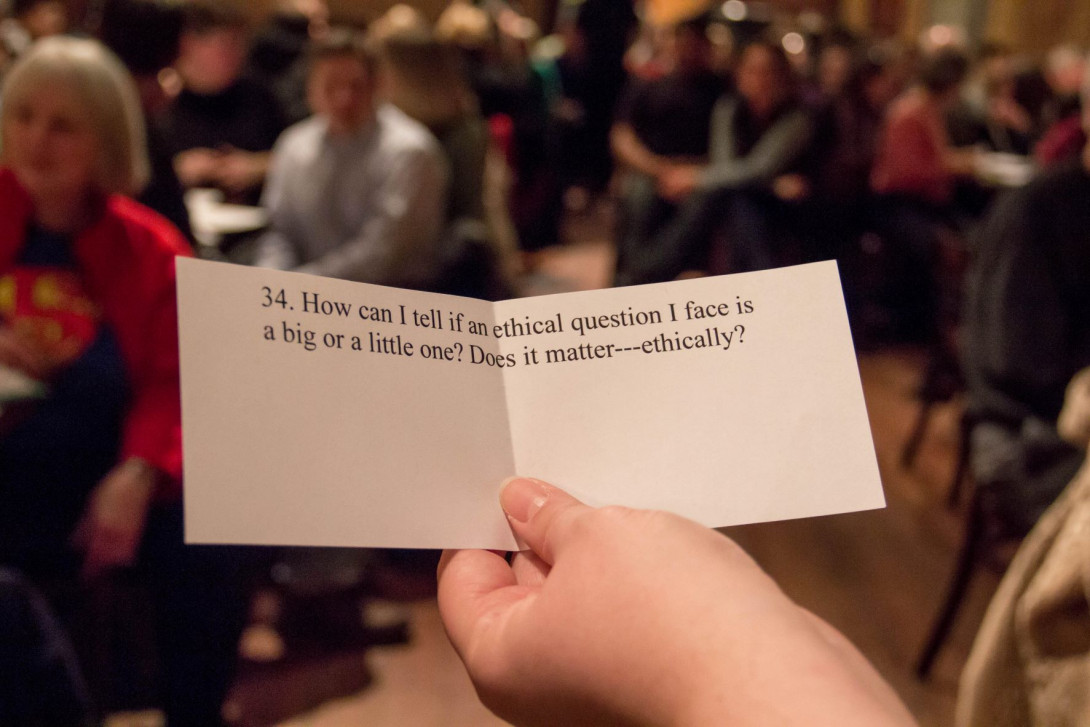2022 Detroit Slam Questions
2022 Detroit Big Ethical Question Slam Questions
1. Is it wrong to keep incarcerated individuals with dementia in prison?
2. What is the courts’ moral role in informing and educating jurors about the history of structural racism and implicit bias?
3. What are the ethical responsibilities of a corporation whose implants, e.g., bionic eyes or heart pacemakers, are now obsolete and unsupported by the company?
4. Is vaccine hoarding by nations justified?
5. Do we have an obligation to become friends with those who experience isolation and loneliness? What does an ethical friendship with the lonely involve?
6. Social media platforms are used to shame individuals who publicly and falsely make claims about themselves. Does such shaming morally matter? Why or why not?
7. You use company tools/technology during the work day to do some freelancing and to check in on your social news feeds. When is the ethical line crossed?
8. Do you agree that canceling student debt is the right thing to do? Why or why not?
9. Should we step in and intervene to prevent wild animal suffering?
10. Civilian contractors and drones are used by the United States military to conduct military operations today. What are the ethics of employing them, instead of relying on a traditional military force?
11. If A.I. can act autonomously and thus have free will, should humans work with them to develop a bill of rights for humans and AI?
12. Should I ever buy my child’s teacher a gift? If yes, what are the ethical dilemmas that should be taken into account?
13. Three fully qualified job candidates have completed their final interviews for a single position. The position they are applying for is in a profession that is 90% white, and social justice conversations within the profession have shown a desire by many to be more inclusive. Should race be a deciding factor in choosing between equally qualified job candidates?
14. Is it right to allow a group of private citizens to form a community crime prevention organization in neighborhoods and for residents who have public safety concerns? Why or why not?
15. Under what conditions/circumstances should there be community-based compensation for environmental injustice?
16. Several city mayors are embracing digital currencies. For example, the mayor of Miami wants to make the city the “crypto capital of the world.” What are the main ethical issues that digital currencies present when city leaders actively promote them?
17. Is it always wrong to ship a defective product to customers/clients?
18. What is the community’s moral obligation to educate its children? Do all children have a moral right to literacy?
19. If a corporation does not keep its promises, for example, to produce safe drugs, keep personal data secure, or provide new jobs for city residents, what obligations, if any, do they have to their customers/clients?
20. If a politician does not keep their promises, for example, to provide new jobs for city residents, what obligations, if any, do they have to residents of their city/community?
21. How should housing repair fund rules be structured to community residents to ensure fair access to these resources?
22. Should a university take a donation, the largest ever for the school, from a donor who started a company that is accused of unethical and poor labor practices?
23. Is it morally permissible to say to a person with a disability that they are inspiring to me and to others?
24. A high school coach discovers talented players, but then learns the players live in another district. The coach fabricates residency documents for the players. Should you turn the coach in if you are in a position to do so? Why or why not?


